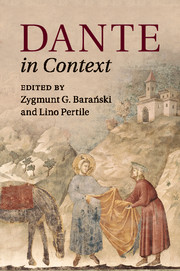Book contents
- Frontmatter
- Dedication
- Contents
- List of illustrations
- List of maps
- Notes on contributors
- Chronology
- Abbreviations and note on translations
- Introduction
- Part I Politics and society
- 1 Empire, Italy, and Florence
- 2 Economy
- 3 Law
- 4 Justice
- 5 Men and women
- 6 Church and orthodoxy
- 7 Heresy and dissidence
- 8 Daily life
- Part II Intellectual traditions
- Part III Linguistic and literary cultures
- Part IV Visual and performative culture
- Part V Dante: life, works, and reception
- Further reading
- Index
3 - Law
from Part I - Politics and society
Published online by Cambridge University Press: 05 October 2015
- Frontmatter
- Dedication
- Contents
- List of illustrations
- List of maps
- Notes on contributors
- Chronology
- Abbreviations and note on translations
- Introduction
- Part I Politics and society
- 1 Empire, Italy, and Florence
- 2 Economy
- 3 Law
- 4 Justice
- 5 Men and women
- 6 Church and orthodoxy
- 7 Heresy and dissidence
- 8 Daily life
- Part II Intellectual traditions
- Part III Linguistic and literary cultures
- Part IV Visual and performative culture
- Part V Dante: life, works, and reception
- Further reading
- Index
Summary
Uzzah between theological and political interpretation
Dante and Virgil, after toiling up a hard rocky slope, arrive at the first of the seven terraces of Purgatory, where the proud are punished for their arrogance. A wall of marble stands before them, adorned with carvings of the sin of pride of such perfection that their execution surpasses not just the supreme sculptor Polycletus, but Nature herself (Purg. X, 28–33). Among the first carvings is one depicting the Levite Uzzah, who, the Bible recounts, joined the procession of Israelites behind the cart carrying the Tablets of the Law to Jerusalem by King David's order. Uzzah stretched out a hand to steady the cart that threatened to overturn because the oxen were restless. That gesture, rather than earn Uzzah divine approval, caused his death. God struck him down on the spot to punish him for his arrogance and irreverence (2 Sam. VI, 4–8).
The ruthlessness of God's judgment did not fail to impress readers of the Bible as far back as the early Middle Ages, when, in Scriptural commentaries, a complex metaphorical interpretation of Uzzah's punishment began to appear – an interpretation that continued to be enriched until the twelfth century, and whose popularity endured well beyond that period. The tale of Uzzah was read as an exemplary case of the relationship between the priesthood and the lay world, and during the many years between Pope Gregory the Great (b. c.540; papacy 590–604) and the theological and juridical texts of the twelfth century, it would be interpreted progressively as a reminder of the need for absolute separation between spiritual and temporal power. The fullest expression of that interpretation is to be found in the Decretum Gratiani (Gratian's Decree). Compiled by Gratian (c.1090–c.1150), who is believed to have been a Benedictine monk who taught at the Monastery of Saints Felix and Nabor in Bologna, the Decretum is a fundamental work of canon law – the law governing the affairs of the Church, especially the law created or recognized by papal authority – written around 1140 that quickly became a key point of reference for jurists in the city, and then in other Italian and European centres of learning.
- Type
- Chapter
- Information
- Dante in Context , pp. 47 - 58Publisher: Cambridge University PressPrint publication year: 2015

